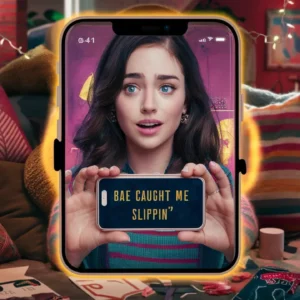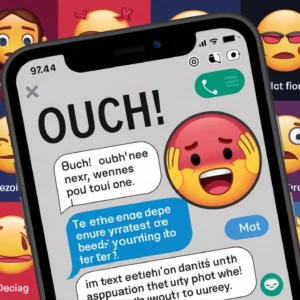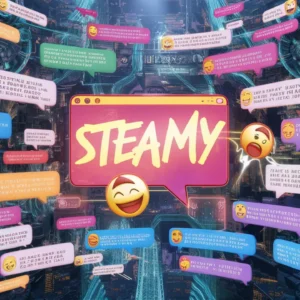The meaning of “ion” in texting can actually depend on the context! Here are the two most common meanings:
1. “I don’t” or “I don’t know”: This is the more common meaning in casual texting, especially among younger generations. “Ion” is a phonetic spelling of the contracted “I don’t,” reflecting the way it’s often pronounced quickly in speech. So, phrases like “ion wanna” would mean “I don’t want to” and “ion knows” would mean “I don’t know.”
2. “In Other News”: This is less common, but you might see “ION” used as an acronym for “In Other News.” It acts as a transition phrase to introduce a new topic unrelated to the previous discussion.
To understand which meaning is intended, consider the context of the conversation. If it’s informal and between friends, “ion” likely means “I don’t” or “I don’t know.” If it’s more formal or discussing broader news, “ION” might be used as “In Other News.”
If you’re still unsure, feel free to ask for clarification! Just saying something like “Wait, do you mean you ‘ion’ know or ‘ION’…” will help the other person clarify their meaning. You should consider reading another article I wrote about >>>> What Does cm Mean in Texting? to learn more.
Decoding the Enigma of “ion”: Navigating the Labyrinth of Texting Slang.
Ah, “ion.” A seemingly simple string of three letters, yet capable of sparking confusion and sparking curiosity in equal measure. As a seasoned spelunker in the ever-shifting caves of texting lingo, I’m here to guide you through the enigmatic world of “ion” and its surprising versatility.
I. From Atoms to Emojis: The Curious Case of “ion”
Let’s first dispel the scientific misconception. While “ion” does indeed denote electrically charged atoms in scientific circles, its reign in text messages resides firmly in the realm of language, specifically, a linguistic phenomenon known as clipping.
This nifty trick involves chopping off syllables to form snappier contractions, like “gonna” for “going to” or “wanna” for “want to.” And guess what? The same fate befell our good friend “I don’t,” morphing it into the oh-so-casual “ion.”
Here’s the nitty-gritty breakdown:
| Traditional Contraction | Phonetic Pronunciation | “ion” Equivalent |
|---|---|---|
| I don’t | I-uh-nt | ion |
| I don’t know | I-uh-no | ion-oh |
See the connection? It’s like our tongues simply couldn’t be bothered with all those extra syllables in casual speak, settling for the beautifully economical “ion.”
II. From Memes to Mainstream: The Rise of “ion”
But where did this linguistic rebel emerge from? Well, my fellow word detectives, the internet, that breeding ground of linguistic innovation, is our prime suspect. Nestled within the vibrant communities of online gaming and social media, “ion” blossomed in the 2000s, finding fertile ground among younger generations who embraced its effortless cool. Memes and viral tweets helped propel “ion” into the mainstream, and before you could say “OMG”, it had infiltrated everyday text messages, leaving bewildered parents and teachers in its wake.
But here’s the thing: “ion” isn’t just about shortening words. It’s about identity, about belonging to a digital tribe that speaks its own language. It’s a badge of casualness, a shorthand for “we get each other,” a playful wink at the absurdity of traditional grammar.
So, the next time you encounter “ion” in a text, don’t panic. Remember, it’s not a scientific experiment gone wrong, it’s just a friendly reminder that language is alive, ever-evolving, and sometimes, delightfully unpredictable.
III. Cracking the “ion” Code: Where Context is King.
So, you’ve grasped the origins of “ion,” but navigating its nuances requires mastering the art of contextual interpretation. Remember, every message exists within a unique ecosystem, and “ion” adapts like a chameleon. Here’s your decoder ring:

Common “ion” Expressions:
- “Ion go there”: A playful way to shut down unwanted discussion or gossip.
- “Ion knows, ion care”: Expressing indifference or lack of knowledge.
- “Ion wanna deal with that”: Avoiding drama or negativity.
- “Ion believes you”: Doubting someone’s statement, often playful.
- “Ion trust you”: Indicating suspicion or lack of confidence.
But beware of homophones! “ion” isn’t the only three-letter word lurking in the shadows. Be mindful of:
- eye-on: Keeping an eye on something.
- yawn: Feeling sleepy or bored.
Punctuation also plays a crucial role. A simple “?” alongside “ion” transforms it into a genuine question, while an exclamation mark amplifies the sentiment.
IV. Beyond “I Don’t”: “ION” Takes Flight.
While “I don’t” remains “ion’s” bread and butter, its versatility extends beyond simple negation. Buckle up, language enthusiasts, because here’s where things get even more fascinating:
- “ION” as “In Other News”: Less common, but occasionally deployed by tech-savvy texters to introduce a new topic, similar to “BTW” (by the way).
- “iont” and “ionno”: Variations of “ion” for “I don’t” and “I don’t know,” often adding a touch of informality.
- Evolving Meanings: As language is a living beast, “ion” might morph further, taking on new connotations and applications. Stay curious, word detectives!
Pro Tip: When deciphering “ion,” consider the sender’s age, relationship with you, and the overall tone of the conversation. Context is your compass, and with practice, you’ll navigate the “ion” landscape like a seasoned explorer.
Remember, language is a journey, not a destination. Embrace the evolution of “ion” and enjoy the playful nuances it brings to our digital communication.
V. The “ion” Impact: From Slang to Social Signpost.
“ion” isn’t just a quirky abbreviation; it’s a cultural touchstone, a marker of belonging and identity within specific online communities. Its usage paints a picture of the texter: casual, tech-savvy, likely belonging to younger generations. It’s a linguistic handshake, a way of saying “We speak the same language, we get each other’s vibe.”
But the “ion” phenomenon also shines a light on the generational divide. Older folks might scratch their heads, while teenagers wield it like a digital wand. This isn’t about judging generations but acknowledging the dynamic nature of language, constantly evolving to reflect the experiences and identities of its users.
However, there’s a flip side to the cool coin. Overusing slang, including “ion,” can come across as unprofessional or disrespectful in formal settings. Remember, code-switching remains key: adapt your language to your audience and context.
VI. Conclusion: Embracing the Enigma of “ion”
As we wrap up this linguistic treasure hunt, remember that “ion” is more than just three letters. It’s a testament to the playful dynamism of language, a testament to how digital communities forge their own linguistic identities. So, embrace the enigma of “ion,” appreciate its versatility, and remember:
- Context is king: Pay attention to the surrounding words and the sender’s relationship with you.
- Embrace evolution: Language is alive, and “ion” might morph further. Stay curious!
- Code-switch like a pro: Adapt your language to the situation and your audience.
Ultimately, “ion” is a reminder that communication is a shared adventure, a dance between meaning and context. So, step onto the dance floor, embrace the slang, and enjoy the ever-evolving rhythm of language!
Bonus Tip: Want to impress your friends with your “ion” mastery? Learn the subtle differences between “ion” and its homophones like “eye-on” or “yawn.” Master the art of context, and you’ll be decoding even the most cryptic texts in no time!



